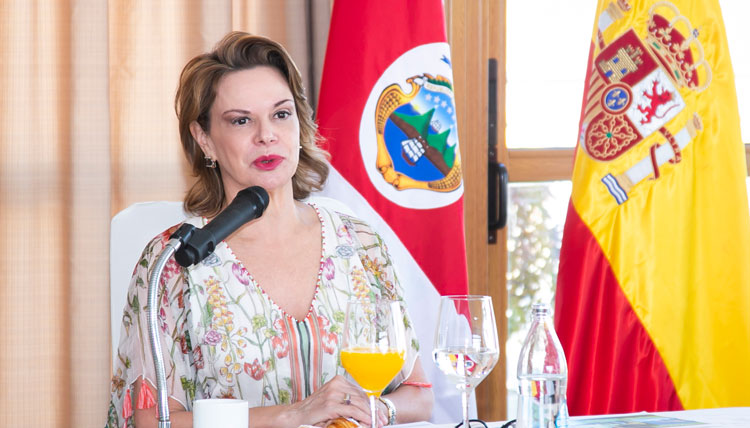The Diplomat
The Ambassador of the Republic of Costa Rica, Ana Helena Chacón, last Thursday, took part in the Breakfast Conference organised, in person and online, by the Bances y Valdés Institute of Historical Studies, in collaboration with the Costa Rican Embassy, at the Club Financiero Génova in Madrid.
After the thanks and welcome given by Alfredo Leonard, Councillor for Institutional Relations of the Corps of the Nobility of the Principality of Asturias, he proceeded to introduce the speaker, who gave the lecture Costa Rica, the Best Kept Secret.
Ana Helena Chacón highlighted the objectives achieved by the Central American country in terms of the economy, tourism and investment, the main drivers of development in all sectors. But what the Costa Rican ambassador was most satisfied with was the work carried out by her country, and by herself during her period as vice-president of Costa Rica, in the area of social policy. Nineteen thousand people stopped going hungry in just one year. New formulas were devised to create jobs accessible to all levels of education, and, above all, full education from childhood was encouraged, without which all of the above would have been much more difficult to achieve.
The Costa Rican ambassador also stressed that it is not so strange to “live without an army” (the military corps was abolished on 1 December 1948). However, “my country’s security forces,” said Ana Helena Chacón, “are very well prepared and play a very important role”.
The ambassador ended by highlighting her role and that of her country in the area of achieving gender equality, the rights of LGBT people, the disabled, feminism, and strongly denounced sex tourism that exploits children and adolescents, an objective to be eradicated by the Costa Rican authorities.
The conference, held in breakfast format, in which all the sanitary measures set by the Spanish government were taken, was attended, among other civil and diplomatic authorities, by the ambassadors of Guatemala, Estonia and Monaco, the Secretary General of the Ibero-American Social Security Organisation, and representatives of the embassies of the Dominican Republic, Hungary, Indonesia and Palestine.






